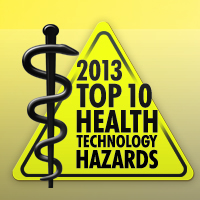 EHR Data Mismatches and Interoperability Failures Make Annual List
EHR Data Mismatches and Interoperability Failures Make Annual List
The Emergency Care Research Institute (ECRI) is a nonprofit organization dedicated to bringing applied scientific research to enable improvement of patient care. The organization is a designated Evidence-Based Practice Center by the U.S. Agency for Healthcare Research and Quality and listed as a federal Patient Safety Organization by HHS.
The institute has just released its 2013 Top 10 Health Technology Hazards. The list highlights the technology safety topics the Institute feels warrants particular attention for the coming year. The Institute makes clear that “the list is not comprehensive, nor will all of the hazards listed here be applicable at all healthcare facilities.” The Institute wants to “encourage facilities to use the list as a starting point for patient safety discussions and for setting their health technology safety priorities.”
What topics made the list? Here’s the rundown:
- Alarm hazards
- Medication administration errors using infusion pumps
- Unnecessary exposures and radiation burns from diagnostic radiology procedures
- Patient/data mismatches in EHRs and other health IT systems
- Interoperability failures with medical devices and health IT systems
- Air embolism hazards
- Inattention to the needs of pediatric patients when using “adult” technologies
- Inadequate reprocessing of endoscopic devices and surgical instruments
- Caregiver distractions from smartphones and other mobile devices
- Surgical fires
Of particular interest to us is that for the first time, three Health IT-related topics made the Institutes annual list. From the report:
In the current healthcare environment, the interplay between complexity and either effectiveness or the potential for harm is perhaps most evident in the realm of healthcare information technology, or health IT. Thus, it shouldn’t be surprising that 3 of the 10 topics on this year’s list are associated with the still-maturing health IT field.
Health IT encompasses information systems such as electronic health records (EHRs), the hardware and software that support human interactions with such systems (e.g., laptops, tablet computers, smartphones), and the interfaces that allow interactions between medical devices and these and other systems.While many health IT implementations offer great promise for improving patient care, it must be recognized that these complex technologies also can create new paths to failure.
You can download the report here.
